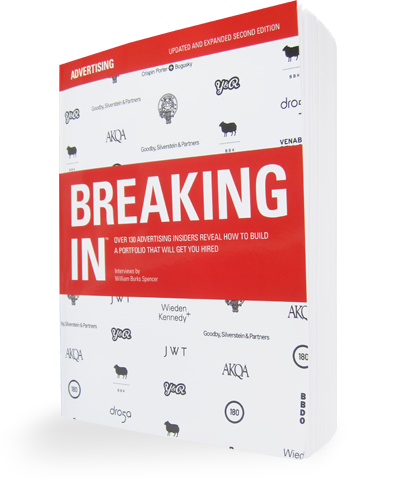Check out some great work from Nigel Roberts.
WS: What do you look for in a student book? And what impresses you?
NR: Ideas that want to stand out, that are original, rather than just emulating what’s already out there at the moment. And intelligence. Stuff that doesn’t just tell you a gag vaguely connected with a product, but gives you some reason to be more interested in the product than you were before, and more likely to want to buy it.
[ … ]
WS: Do you think writers need to have a long-copy ad in their books to show they can write, and do you think art directors should have long copy in their books to show they can lay it out?
NR: I don’t think it’s essential, no. I don’t think many people will take the time to read long copy in a portfolio anyway, because time is tight. The copywriting skills of a junior copywriter—-to be able to write long copy-—is something that you can tackle once you’re in the job. But you must show that you are capable of writing headlines. You need to show a good enough command of the language to be able to express what you need to in a concise, persuasive way.
WS: What do you think about including things in a book that aren’t ads?
NR: If I’m absolutely honest, I’m not that interested in it. But I know it’s fashionable at the moment to hire creatives from all sorts of different areas, possibly not related to advertising at all. Some people think it makes them more interesting. But does it make them better able to produce good advertising? I’m personally not sure. I think the job itself is focused enough. You have to prove, first and foremost, that you can do the job you’re there to do. If you’ve got an advertising problem to solve, then whether any interest in something unrelated is going to help you solve that problem is debatable.
WS: What do you think is the best way to improve?
NR: Just never stop. Never be satisfied with anything you’ve done, really. There is no such thing as the perfect solution to any brief. And that’s where research screws us over, because research tries to find the perfect solution. But there isn’t the perfect solution. The best you can get is something that’s pretty good and will do the job and persuade more people to buy your product or service, than just sticking a bit of branding in front of them or whatever. So you should never think you’ve done the perfect ad yourself, you should never feel satisfied with it. Always know that if you keep going you’ll do something better. Just never be satisfied. If you are too easily satisfied, you become lazy, and possibly arrogant. It is easy to criticize advertising. If you’ve got it objectively right, then it’s down to subjective opinion. If you are your own harshest critic, then you can be more confident in the work you eventually do present.
There is nothing worse than seeing a student portfolio that is too easy to criticize, and seeing that the team has heard it before. If you know something isn’t right, change it. Otherwise you’ve wasted the other person’s time and, more importantly, your opportunity. You only get one chance to make a first impression.

Comments are closed.